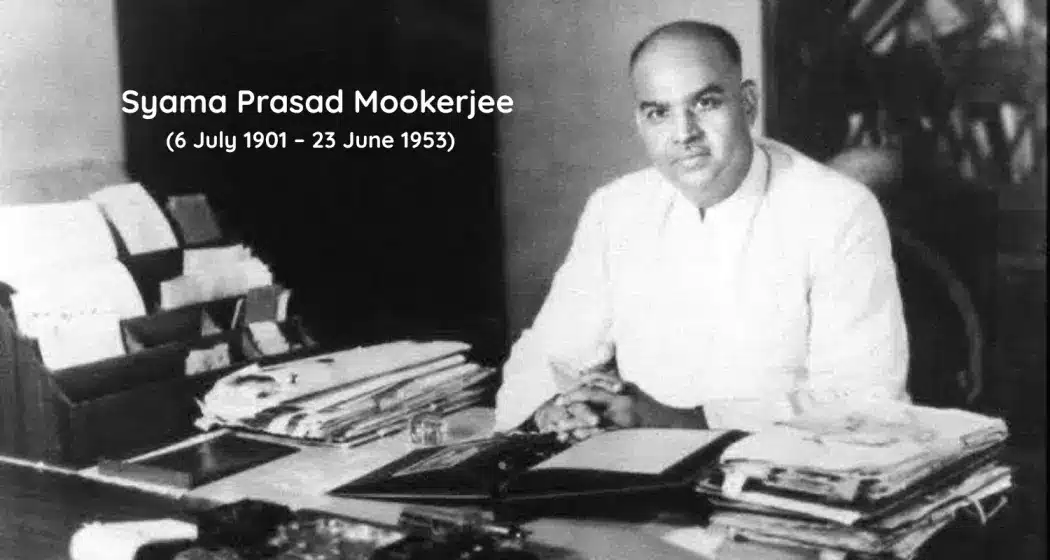Commemorating Dr. Syama Prasad: ‘One Constitution, One Symbol, One Leader’

The Vice-President of India, Shri Jagdeep Dhankhar, commemorated the legacy of Dr. Syama Prasad Mukherjee on his Balidan Diwas, emphasizing the significance of his contributions to the nation. During a tribute, he recalled Mukherjee’s impactful slogan from 1952, advocating for unity in governance. Dhankhar also addressed the challenges posed by Article 370 in Jammu and Kashmir, highlighting its abrogation in 2019 as a pivotal moment for the region. His remarks came during the inaugural session of the 99th Annual Meet and National Conference of Vice Chancellors, where he underscored the transformative potential of the National Education Policy 2020.
Tribute to Dr. Syama Prasad Mukherjee
In a heartfelt tribute, Vice-President Dhankhar honored Dr. Syama Prasad Mukherjee, describing him as one of the finest sons of India. He marked the occasion as a significant day in the nation’s history, recalling Mukherjee’s powerful slogan advocating for a unified governance structure in the country. “एक विधान, एक निशान और एक प्रधान ही होगा देश में दो नहीं होंगे,” he quoted, emphasizing the importance of a singular governance model. This slogan was articulated during Mukherjee’s campaign in Jammu and Kashmir in 1952, reflecting his vision for a cohesive nation. Dhankhar’s tribute also highlighted the long-standing challenges faced by the region due to Article 370, which he stated had deprived the people of their fundamental rights for too long. He expressed gratitude for the leadership of Prime Minister Narendra Modi and Home Minister Amit Shah in abrogating the article in August 2019, marking a new chapter for Jammu and Kashmir.
Transforming Education through National Education Policy
During his address at the National Conference of Vice Chancellors, Vice-President Dhankhar discussed the transformative impact of the National Education Policy (NEP) 2020. He noted that this policy, which emerged after more than three decades, has significantly altered the educational landscape in India. As a former Governor of West Bengal, Dhankhar played a role in shaping the NEP, which he described as a collective effort that incorporated inputs from thousands of stakeholders across the nation. He emphasized that the policy resonates with India’s civilizational spirit and aims to awaken the self through education, not merely to impart skills. Dhankhar asserted that education serves as a great equalizer, fostering equality and empowering democracy. He commended the Government of Uttar Pradesh for its initiatives in education, particularly highlighting the transparency and accountability in the state’s educational administration.
Universities as Catalysts for Change
Vice-President Dhankhar stressed the crucial role of universities in shaping the future of India. He asserted that institutions of higher education should not merely confer degrees but should also serve as sanctuaries for ideas and innovation. He called upon Vice-Chancellors to ensure that universities become crucibles of change, fostering an environment where debate and dialogue thrive. Dhankhar highlighted the need for universities to prepare students for “impossible choices,” which he believes define character and strength. He urged academic leaders to create spaces for disagreement and discussion, essential elements of a vibrant democracy. Furthermore, he emphasized that the state of education reflects the overall state of the nation, urging India to build world-class institutions that not only educate but also pioneer advancements in various fields.
Call for Equitable Expansion in Higher Education
In his concluding remarks, Vice-President Dhankhar called for a more equitable expansion of higher education across India. He pointed out that many educational institutions remain underdeveloped and concentrated in metropolitan areas, leaving other regions underserved. He advocated for the establishment of new institutions in these areas to ensure broader access to quality education. Dhankhar emphasized that Vice-Chancellors should act as guardians against the commodification of education, striving to make quality education affordable and accessible to all. He concluded by challenging the academic community to lead in emerging fields such as artificial intelligence and climate technology, asserting that education is not just a public good but a strategic national asset integral to India’s development and security.
Observer Voice is the one stop site for National, International news, Sports, Editor’s Choice, Art/culture contents, Quotes and much more. We also cover historical contents. Historical contents includes World History, Indian History, and what happened today. The website also covers Entertainment across the India and World.
Follow Us on Twitter, Instagram, Facebook, & LinkedIn

